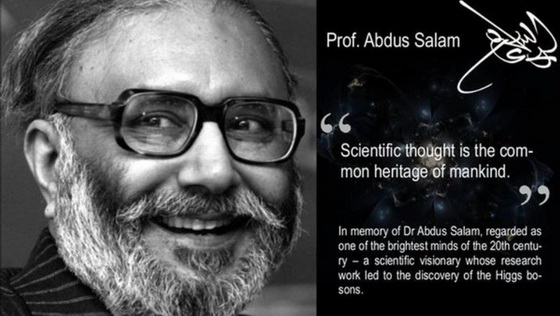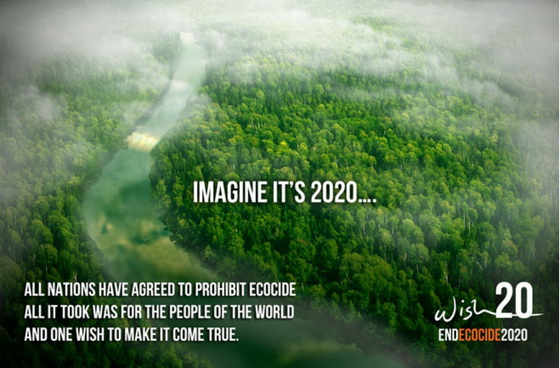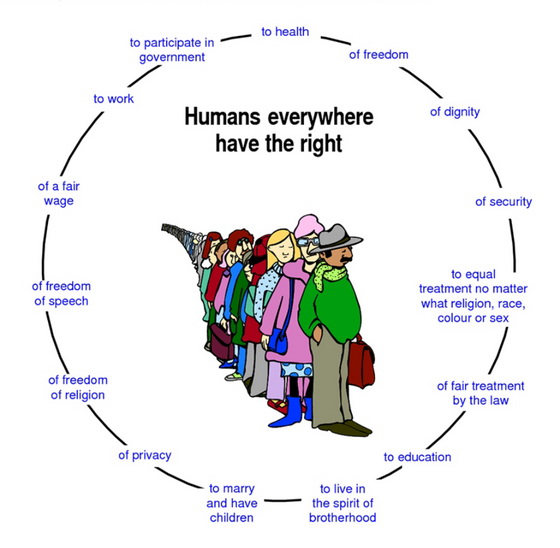Article 43: Declare the Earth ‘Common Heritage of Mankind, walk your own talk and above all, remember your humanity!
“It is hoping against hope – but I still hope that the present danger of global death will be the shock which awakens humanity. If man survives after this century, it will be a new man and a new humanity. One thing is certain: Either man has to die or man has to change. I cannot think that man will choose to die. The longing for life is so great… just to think that the Earth has become dead – no trees, no humanity, no birds, no animals, no sea animals….” – to quote Osho in The Rebellious Spirit, Ch 12, Q 3

This is the right moment for change! You have a network of improved and affordable telecommunications. Space travel has shown you the first images of your fragile planet, floating in the vastness of space. You are confronted with the emergence of global warming, with a world population expected to rise to 9 billion in 2050 and other ecological threats to your collective existence. New global institutions arise, such as the United Nations, World Trade Organization, International Criminal Court, global NGO’s, transnational social movements – such as the World Social Forum – and independent Research Institutes, devoted to global environmental concerns, like Worldwatch Institute, founded in 1974 by Lester R. Brown.
Declare the Earth as common heritage of mankind, as common heritage of humanity, a principle of international law which holds that the whole planet should be held in trust for present and future generations and be protected from exploitation by individual nation states and corporations.

The Earth, Common Heritage of Mankind
Do for the Earth what you did already for the outer space in ‘The Outer Space Treaty’ – formally the ‘Treaty on Principles Governing the Activities of States in the Exploration and Use of Outer Space, including the Moon and Other Celestial Bodies’ – a treaty that forms the basis of international space law. As of September 2015, 104 countries are parties to this treaty, while another 26 have signed the treaty, but have not yet completed its ratification.
Do to the land what you did already to the ocean floor. In 1982, the Common Heritage of Mankind concept was stated to relate to “the seabed and ocean floor and subsoil thereof, beyond the limits of national jurisdiction” under Article 136 of the United Nations Law of the Sea Treaty.
In this way, international law protects, respects and fulfills the interests of human beings, independently of any politically motivated sovereign state.

The concept of common heritage is covering all humans, wherever they are living, as well as future generations.

A similar principle of international law holds that the world’s scientific, cultural and natural heritage must be protected by state parties to the UNESCO World Heritage Convention.
Do to the killing of the Earth and of the people living there what you have to do to any act of killing.
Include the Earth into the Rome Statute. The Rome Statute is one of the most powerful documents in the world, assigning ‘the most serious crimes of concern to the international community as a whole’ over and above all other laws. Four crimes that already exist within the jurisdiction of the International Criminal Court, under Article 5 of the Rome Statute, are known collectively as ‘Crimes Against Peace’.
They are the crime of Genocide, crimes against Humanity, War crimes and the crime of Aggression. Now add the crime of Ecocide.

“Ecocide is the extensive damage to, destruction of or loss of ecosystems of a given territory, whether by human agency or by other causes, to such an extent that peaceful enjoyment by the inhabitants of that territory has been or will be severely diminished.”
In 2010, the proposal to amend the Rome Statute to include an international crime of Ecocide was submitted by Polly Higgins to the International Law Commission (ILC). The ILC is the UN body ‘mandated to promote the progressive development of international law and its codification’. The purpose for creating the offense of Ecocide as the 5th international Crime Against Peace, is to put in place an international law at the very top level. 122 Nations (as of 2015) are State Parties to the Rome Statute. International Crime (which is codified in the Rome Statute) applies not only to the signatory states. If and when a person commits a Crime Against Peace, the International Criminal Court has powers to intervene in certain circumstances, even if the person or State involved is a non-signatory.
The inclusion of Ecocide law as international law prohibits mass damage and destruction of the Earth and, as defined above, creates a legal duty of care for all inhabitants that have been or are at risk of being significantly harmed due to Ecocide. The duty of care applies to prevent, prohibit and pre-empt both human-caused Ecocide and natural catastrophes. Where Ecocide occurs as a crime, remedy can be sought through national courts and the International Criminal Court (ICC) or a similar body.

Credit to The Hague Institute for Global Justice
Do to the killing of the Earth and of the people living there what you have to do to any act of killing.
I have found more wonderful documents in your UNESCO libraries. Therefore, my second advice today would be: Walk your own talk!
Practice the Universal Declaration on the Human Genome and Human Rights, a document that was issued by the United Nations Educational, Scientific and Cultural Organization (UNESCO) at its 29th session in 1997. It was unanimously passed by the 77 national delegations in attendance. The declaration is perhaps best known for its statement against human cloning and abuse of human genome against human dignity.

Practice the UNESCO Declaration on the Responsibilities of the Present Generations Towards Future Generations, proclaimed on November 12, 1997, an international agreement which includes:
Article 4: “The present generations have the responsibility to bequeath to future generations an Earth which will not one day be irreversibly damaged by human activity. Each generation inheriting the Earth temporarily should take care to use natural resources reasonably and ensure that life is not prejudiced by harmful modifications of the ecosystems and that scientific and technological progress in all fields does not harm life on Earth.”

Article 7: “With due respect for human rights and fundamental freedoms, the present generations should take care to preserve the cultural diversity of humankind. The present generations have the responsibility to identify, protect and safeguard the tangible and intangible cultural heritage and to transmit this common heritage to future generations.”

Article 8: “The present generations may use the common heritage of humankind, as defined in international law, provided that this does not entail compromising it irreversibly.”
Article 9: 1. “The present generations should ensure that both they and future generations learn to live together in peace, security, respect for international law, human rights and fundamental freedoms.”
2. “The present generations should spare future generations the scourge of war. To that end, they should avoid exposing future generations to the harmful consequences of armed conflicts as well as all other forms of aggression and use of weapons, contrary to humanitarian principles.”
Practice the Declaration of Human Duties and Responsibilities.
This Declaration (DHDR) was written under the auspices of the UNESCO and the interest of the UN High Commissioner of Human Rights, to commemorate the 50th anniversary of the 1948 Universal Declaration of Human Rights (UDHR) and for reinforcing the implementation of these human rights and was proclaimed in 1998 in the city of Valencia. Therefore, it is also known as the Valencia Declaration.

The point of departure of the DHDR Preamble is the shared concern regarding the lack of political will for enforcing globally human rights. The drafting of the declaration has been the result of the committed and disinterested work of a group of experts: Nobel laureates like Joseph Rotblat (Peace, 1995), Wole Soyinka (Literature, 1986) and Dario Fo (Literature,1997), scientists, artists and philosophers – representing all the regions of the world – and the judicious chairmanship of Richard Goldstone from South Africa.

Akinwande OluWole Babatunde Soyinka
In the awareness that, for the first time in human history, the survival of humankind is in peril, due to human action, they felt a need to transform ‘moral duties’ into ‘legal duties’: “The recognition of human rights is insufficient… If such so rights are to be realized, it is necessary that they are enforceable… There must be a duty on all relevant authorities and individuals to enforce those rights.”
Joseph Rotblat was the only physicist to leave the Manhattan Project (1942–46) on the grounds of conscience. He became one of the most prominent critics of the nuclear arms race and campaigned ceaselessly against nuclear weapons. Central to his view of the world were the words of the Russell-Einstein Manifesto with which he concluded his acceptance lecture for the Nobel prize in 1995: “Above all, remember your humanity.” (The Russell–Einstein Manifesto was issued in London on 9 July 1955 by Bertrand Russell in the midst of the Cold War. It highlighted the dangers posed by nuclear weapons and called for world leaders to seek peaceful resolutions to international conflicts. The signatories included eleven pre-eminent intellectuals and scientists, including Albert Einstein, who signed it just a few days before his death on 18 April, 1955).

So, like Joseph Rotblat, walk your talk! There is only one kind of magic and that is ‘doing’.

Credit to Tushita
Thanks to Polly Higgins, reporting on Ecocide, and to Wikipedia, the Declaration of Human Duties and Responsibilities
 Shanti is a regular contributor
Shanti is a regular contributor
All essays of this series can be found in: At Home in the Universe
All articles by this author on Osho News




Comments are closed.